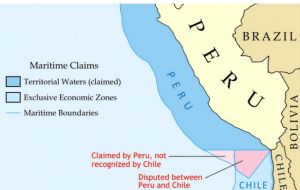MercoPress. South Atlantic News Agency
UN highest court settles maritime dispute: pride for Peru, rich fisheries remain for Chile
 Chilean president Piñera disappointed with the ruling
Chilean president Piñera disappointed with the ruling The United Nations’ highest court set a maritime boundary between Chile and Peru on Monday that grants Peruvians a bigger piece of the Pacific Ocean while keeping rich coastal fishing grounds in the hands of Chilean industry. Despite high emotions over the dispute, the ruling is expected to have little effect on cordial ties between the two neighbors whose economic interdependence has grown greatly in recent years.
Chile’s outgoing president, Sebastian Piñera, called the International Court of Justice’s ruling “a lamentable loss” in a nationally televised address. But President-elect Michelle Bachelet, who takes office in March, said that “most of the fishing occurs inside the area that the court ratified as belonging to our country.”
Peru’s leader, Ollanta Humala, told his countrymen on national TV that he was satisfied with the outcome, saying the court had recognized Peru’s argument that no maritime treaty previously existed between the South American neighbors.
In Chile’s northern port of Arica, police dispersed a group of fewer than 100 small-time fishermen with water cannon after some, considering themselves losers, hurled stones at a military barracks.
The ruling announced in a European courtroom ends a decades-old dispute centered on nearly 38,000 square kilometers of the world’s richest fishing grounds - the value of the area’s annual catch has been estimated at 200 million dollars.
Peruvian historian Nelson Manrique called the ruling an “intelligent verdict” that is “not going to please anyone but it’s also not going to bring anyone to fits.”
The case filed by Peru in 2008 was a matter of national pride for Peruvians, some of whom maintain rancor over the 1879-83 War of the Pacific in which Chile gained its three northernmost provinces by winning territory from Peru and Bolivia. Bolivia lost its coast in the conflict.
Humala, a retired army officer when he was elected Peru’s president, called Monday “one of the days that will mark my life, and I feel proud to have lived as a soldier and now as a politician. I feel prouder every day to be Peruvian.” The national anthem then played.
Peru had sought a sea border perpendicular to the coast, heading roughly southwest. Chile insisted the border extend parallel to the equator.
The court, whose rulings cannot be appealed, compromised by saying a border already existed parallel to the equator extending 80 nautical miles from the coast. From there, it drew a line southwest to where the countries’ 200-mile territorial waters end.
Patricia Majluf, a leading Peruvian fisheries scientist, said the area remaining in Chilean hands “is where the Chilean boats fish the most”. She added ”all the anchoveta is fished in that zone”.
Majluf said about 1 million tons of anchoveta are harvested annually off the northern Chile coast, about the same amount as off the southern Peruvian coast.
Peruvian economist Juan Carlos Sueiro said the verdict maintains the status quo in the anchovy industry, benefiting in particular Chile’s Grupo Angelini, while Peruvian fishermen can catch shark, tuna, mackeral, cuttlefish and mahi-mahi farther offshore will also benefit.
Despite differences over fishing, the border area has been a model of coexistence. Citizens of both countries travel across it freely, with Chileans crowding into hospitals and clinics in Tacna, Arica’s sister city for cheaper health care. Peruvians work in construction and other day jobs on the Chilean side.
The two countries, both members of the flourishing Pacific Alliance, had previously agreed that whatever the ruling they would accept it and help with the post-Hague implementation.






Top Comments
Disclaimer & comment rules-

-

-

Read all commentsThe maturity shown by both these countries during this dispute is praiseworthy.
Jan 28th, 2014 - 07:11 am 0It is a pity that not all countries can do the same.
It is also great to see that the economic and social integration between Peru and Chile grows almost faster than their economic growth. No economic sabotage.
I'm not happy with the verdict, how the hell did they come up with the 80 miles? A sad day for us but we are signed up to accept the authority of the ICJ so tough luck I guess. Maybe we should look at withdrawing from the treaty that recognises the ICJ since Bolivia is coming for us next.
Jan 28th, 2014 - 08:01 am 0TCp don't worry, just do what the Argies do: scream, shout, complain and moan about an alleged injustice. But when it is suggested politely that they should seek a binding resolution at the ICJ, they go surprisingly quiet.
Jan 28th, 2014 - 08:25 am 0Commenting for this story is now closed.
If you have a Facebook account, become a fan and comment on our Facebook Page!